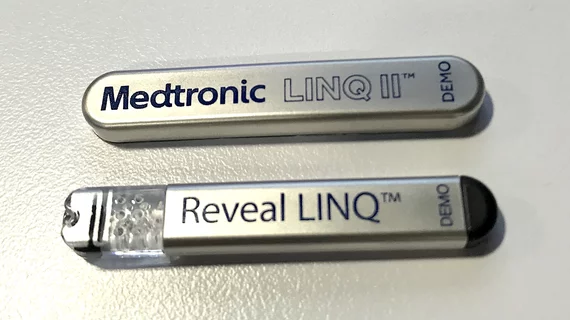STROKE AF study shows insertable cardiac monitors detect 4 times more AFib than Holter monitoring
New data from the STROKE AF clinical trial, which showed that large and small vessel ischemic stroke patients who receive short-term or intermittent monitoring with Holter and 30-day external monitors, may not be optimally managed for recurrent stroke prevention versus those who received continuous implantable cardiac monitors (ICM). The data will be presented at the Heart Rhythm Society (HRS) annual Heart Rhythm meeting in San Francisco May 1.
In the analysis, which used simulation methods to evaluate 242 patients, the rate of atrial fibrillation (AFib) incidence (≥2 minutes) was 12.1% at one year in patients with the Medtronic Reveal Linq ICM, while intermittent monitoring showed an AFib incidence rate between 0.2% - 2.5% during the same period. Results indicated that even the most aggressive intermittent monitoring strategy would have missed 79% of patients who had ≥2 minutes of AFib detected.
"Based on the primary findings from the STROKE AF study, we know that detection of AF after stroke is important because it often leads to an evidence-based change in therapy that can prevent secondary stroke from occurring,” Jonathan Piccini, MD, electrophysiologist and associate professor of medicine at Duke University Medical Center in Durham, North Carolina, said in a statement on the study. “This analysis using simulation methodologies tells us just how much AFib would be missed in these ischemic stroke patients when intermittent monitoring strategies are used instead of continuous monitoring. The majority of patients with AFib after stroke would have eluded detection with even the most comprehensive intermittent monitoring strategy; therefore, the absence of AFib with intermittent monitoring does not always imply freedom of AFib.”
The sub-analysis is part of the STROKE AF prospective, multi-site, randomized 1:1 clinical trial comparing ICM monitoring to site specific standard of care (SOC) in patients with stroke attributed to large artery atherosclerosis (LAA) or small vessel occlusion (SVO). Primary results from the STROKE AF trial demonstrated the superiority of the Reveal Linq to detect AFib in both large and small vessel stroke patients compared to standard of care.
The findings were published in the June 1, 2021 issue of the Journal of the American Medical Association (JAMA).[1]
ICM technology has seen a rise in popularity in recent years. One reason is the simplicity to use and insert into patients. Watch the VIDEO: How to implant a Linq implantable cardiac monitor.
Related Implantable Cardiac Monitor Content:
Medtronic gains FDA approval for AI models focused on cardiac monitoring
Medtronic’s new ICM gains FDA clearance, CE mark approval
Medtronic’s new cardiac monitor receives FDA approval
Scripps Clinic first to implant miniature cardiac monitor
Links to all the Heart Rhythm 2022 late-breaking studies
Find more electrophysiology news
Reference:

